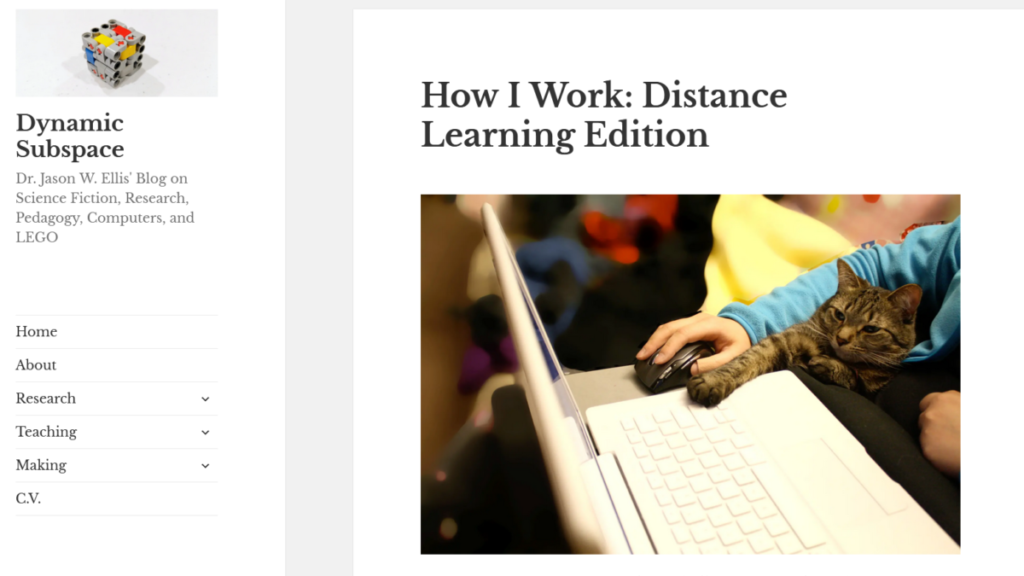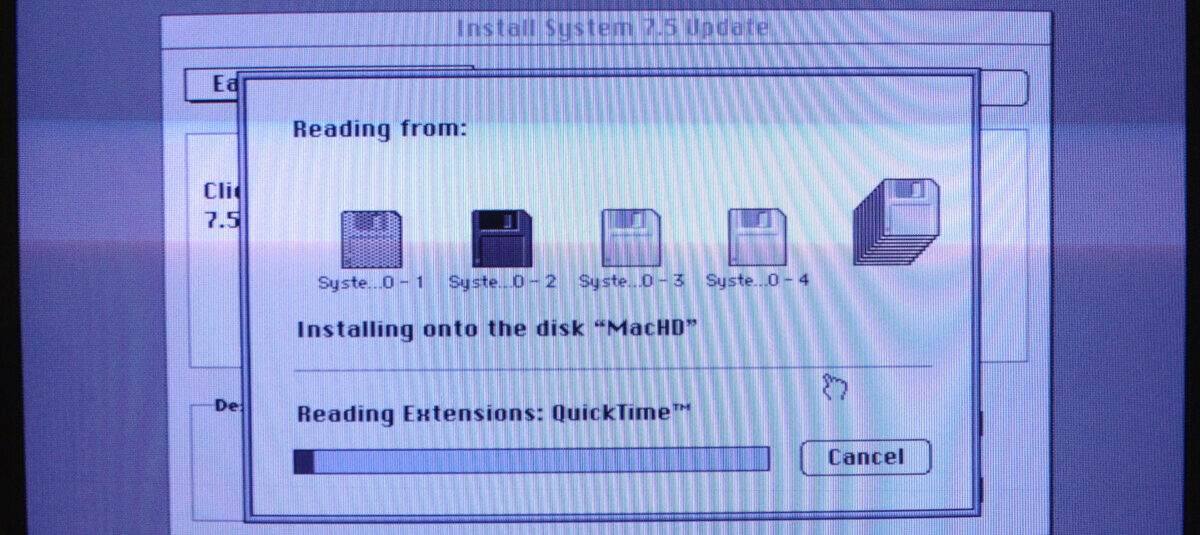
In the screenshot above, you can see the header image of a post that I wrote about my teaching setup and workflow when the pandemic began. It’s purpose was to help less technically savvy colleagues see how to setup their workspace and develop a digital workflow meant to support teaching remotely. When you have to figure out a workflow or process on your own, it can be a great writing exercise to commit it to the page and share it online–not only as a way to help others but also as a way to demonstrate your expertise about the process and as a technical communicator!
- Beginning of Class Writing Assignment
- Catch up on readings discussion
- Introduce final portfolio
- Studio time for peer review, usability testing, and working on final portfolio




To: Professor Ellis
From: Tiana Beatty
Date: Dec. 01. 2022
Subject: Weekly Readings
I didn’t think that writing acted a form of discipline but just served as a medium for expression of thoughts, ideas, and communication. I know you can learn various types of writing formats, templates, and styles; but I didn’t think that learning to write came as a discipline. I know that writing can and will always be a development as new styles and approaches can captivate the reader in understanding what the writer’s message is. There is a such thing as analysis or critical thinking writings such as essays and reports, but knowing that writing requires more than just the basic techniques and understandings to become a discipline for the person is something I found interesting one of the readings. My main curiosity is what would make writing a discipline not becoming involved in the social aspect of communication or expression? Is it because of the concept of new knowledge and information written in the writing itself? This is something that I hadn’t expected nor did I believe because for me personally, writing has always been a form of expression. It allows me to express my creative thoughts through imagination as the words that I type or write down flow across the page creating stories and worlds that I didn’t know were even possible. But I wonder can I consider writing creatively as a form of discipline because it’s coming from me and the expressive thoughts that I’ve imagined or constructed?
To: Prof Ellis
From: Bria Glenn
Subject Week 13
Date: December 1, 2022
Learning to write in the disciplines sounded confusing a first because I didn’t understand what the authors meant by it. After further reading, I got the concept that while writing is mainly used as an academic tool and it directly relates to one’s ability to learn. This can be true for some people. There are those learn better with visuals and others who can learn by simply hearing what is being taught. Learning to use writing for other areas such as social can strengthen writing skills. I believe with social media, people write statuses, captions for photos, replying to comments which is writing being used for social purposes. With WAC and WID being two forms of writing, I believe writing in the disciplines allows for students to learn about the different approaches to writing. While the author’s make the claim that WID does not focus on learning, I do not believe that is entirely a negative thing. Students should definitely be learning, but it would not hurt for them to be well-versed in other areas
To: Professor Ellis
From: Sandy Fougeres
Date: 12/1/22
Subject: Weekly Readings
In this weeks readings, the discussion was on writing across curriculums (WAC) and writing in disciplines (WID). In the article, “Writing to Learn by Learning to Write in the Disciplines,” by Michael Carter et al., it discussed the major discourse behind whether students learn just from writing. That writing across curriculums doesn’t necessarily mean that your learning because your writing in these subjects, that with the WID it allows students to engage in their chosen discipline through discourse and socialization. Therefore, they can learn about the discipline and write about which could be seen as a way of learning. The article then continues to describe the issues with both WAC and WID being that there isn’t concrete evidence that writing in either is learning and the questions being how exactly can writing lead to learning.
In the second article, “The Future of Technical Communication: Introduction to This Special Issue,” by Michael J. Albers, he discusses how technical communicators and students in the major have issues with utilization technology as a medium to create a document and not just a tool that needs to be learned constantly. He describes how students would ask to learn a new technology and that they would feel inadequate if they don’t know how to use it. That technical communication has because less about using the technology to support in creating documentation and more about learning the technology. I can agree with both articles in that I believe WID is necessary in learning because it is better to be immersed in the things you are writing back which will facilitate learning those things (disciplines). I also agree with the second article in that there is so much technology that learning all is impossible, that it is best to focus on your audience then decide on which technology is best to execute the document.
TO: Professor Ellis
FROM: Khaled Akam
DATE: Dec 1, 2022
SUBJECT: Writing fosters learning
Through out the years many individuals have studied the best way to learn. During a study of students all forms of writing improved performance. Same can be said for boosting behavior in a student’s learning. The best thing to do is experiment in variations of writing practices that fit for you in any scenario. Experience in learning something is completely different when writing about it is included. By gaining the appropriate experience in learning, matters get easier, and you can comprehend/memorize well. Students have expressed when writing for their labs their focus is improved.
Technical communicators have not only been handling writing documents but are fundamental to providing works outside of their intended setting. Because tools change rapidly in the job market, the ever presence of keeping up with technology is a fight of itself. With understanding innovative technologies, we are more aware of the need to adapt as a technical communicator to manage various aspects of the job. Rather than try to learn these tools, we must ask ourselves which will be implemented in the future because you never know what will fade out.
We are in the shift of integration of technology with writing. The new tools technology provides us with are inspiring but scary. Not knowing what implementation of tools will be impactful is part of the process of learning by doing the work. Technical communicators need to be ahead of the field in technology and writing to be able to adapt fast enough for the latest changes. New situations arise that we must be prepared for it.
To: Professor Ellis
From: Timothy B
Date: Nov. 1 2022
Subject: The Future of Technical communication
This week we read about two distinct things in technical writing which is writing in the disciplines (WID) paired with situated learning and the expansion of technical communicating as a whole besides just the usual documentation process. In “Writing to Learn By Learning to Write in the Disciplines” it discusses how “writing disciplinary discourses in disciplinary settings encourages socialization into the disciplines. Also how lab reports in a biology lab suggest five ways in which writing promotes learning in scientific disciplines”. In the second article The Future of Technical Communication” it was interesting to read that technical communicators have been expanding into other realms of communication such as interface, interaction design, information architecture, information design and usability”. All this information is how technical communication can become and develops into distinct linear branches. Once the surface level of communication is addressed which is writing documents there are more mediums of technical communication to be examined and articulated.